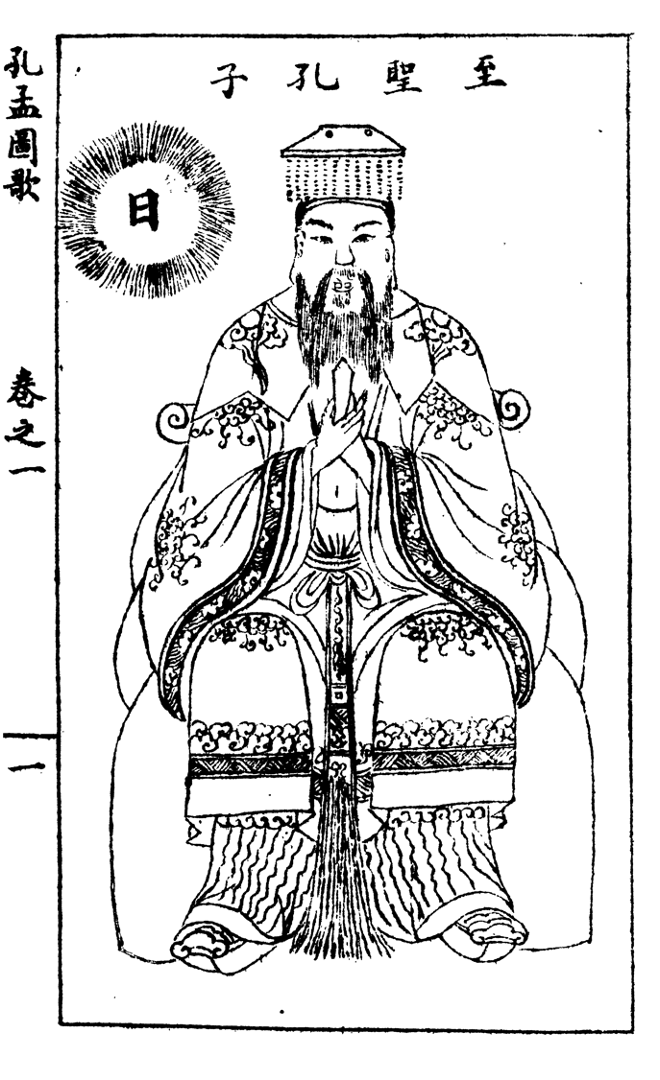孔孟圖歌 - L205
孔孟圖歌 Kong Meng tu ge |
| 別名 Other Titles: 江鐘秀 |
| 有關人物 Associated Persons: 江鐘秀
出版地區 Place(s) of Publication: 山左歷城, 山西 版式 Format: 木刻版 出版者 Publisher(s): 出版年 Publication Date: 1904 載於 Located In: Ming Qing minjian zongjiao jingjuan wenxian xubian - L Volume 12, p. 471-515 |
| Cite as 引用為: "CRTA 孔孟圖歌 - L205" |
This is a hagiographical text on Confucius and Mencius published in 1904 by Jiang Zhongxiu 江鐘秀 based in Shanxi who spent much time sorting the classics and advocating Confucian values.
別名 Other Titles
出版地區 Place(s) of Publication
The location given at the end of the preface is 山左歷城 (Shanxi 山西 Province).
出版年 Publication Date(s)
The date at the end of the preface, 光緒三十年三月念六日, corresponds with 1904-5-11.
有關人物 Associated Person(s)
No Additional Information
內容 Contents
- 封面 Title Page
- 孔孟圖歌序 「太陽太陰為天上之日月...」
- 孔孟圖歌緣起「一歌詞 神奇鬼怪...」
- 孔子圖歌序 「日者 凡星所及...」
- 卷之一(1a-49b)
- 孔子圖歌後結 「中庸曰 天命之為性...」(50a-50b)
序跋等 Prefaces and Postfaces
- 孔孟圖歌序 「太陽太陰為天上之日月...」
- 光緒三十年三月念六日
- 山左歷城江鐘秀
- 孔孟圖歌緣起「一歌詞 神奇鬼怪...」
- 孔子圖歌序 「日者 凡星所及...」
- 光緒三十年三月念六日山左歷城江鐘秀
- 孔子圖歌後結 「中庸曰 天命之為性...」
註疏 Commentary
The book basically follows a chronological order and narrates important moments of the life of Confucius and Mencius. The current manuscript copy only has the part on Confucius. It begins from a preface that argues Confucius' teaching is better than other teachings, especially Christianity. It also indicates that following Confucianism by learning from his traces will guarantee the prosperity of the country. It also discusses the importance of having images to generate ordinary readers’ interest. The main text of the book is a mixture of citations from classics (jiang 講) and oral vernacular verses (xuan 宣) on the life of Confucius. It begins from his glorified birth until his death, with famous events such as learning zither from Master Xiang and the Chen-Cai plight. The quality of the pictures in the book is rough, and they seem to be from a non-professional painter. It inherits the Shengji tu (聖蹟圖 Pictures of the Sage’s Traces) tradition of earlier dynasties but with a stronger emphasis on orality. By this means, the sacredness of Confucius’ life is more accessible to common readers.
參考文獻 Bibliography
None
電子全文 Digital Fulltext
None Available
